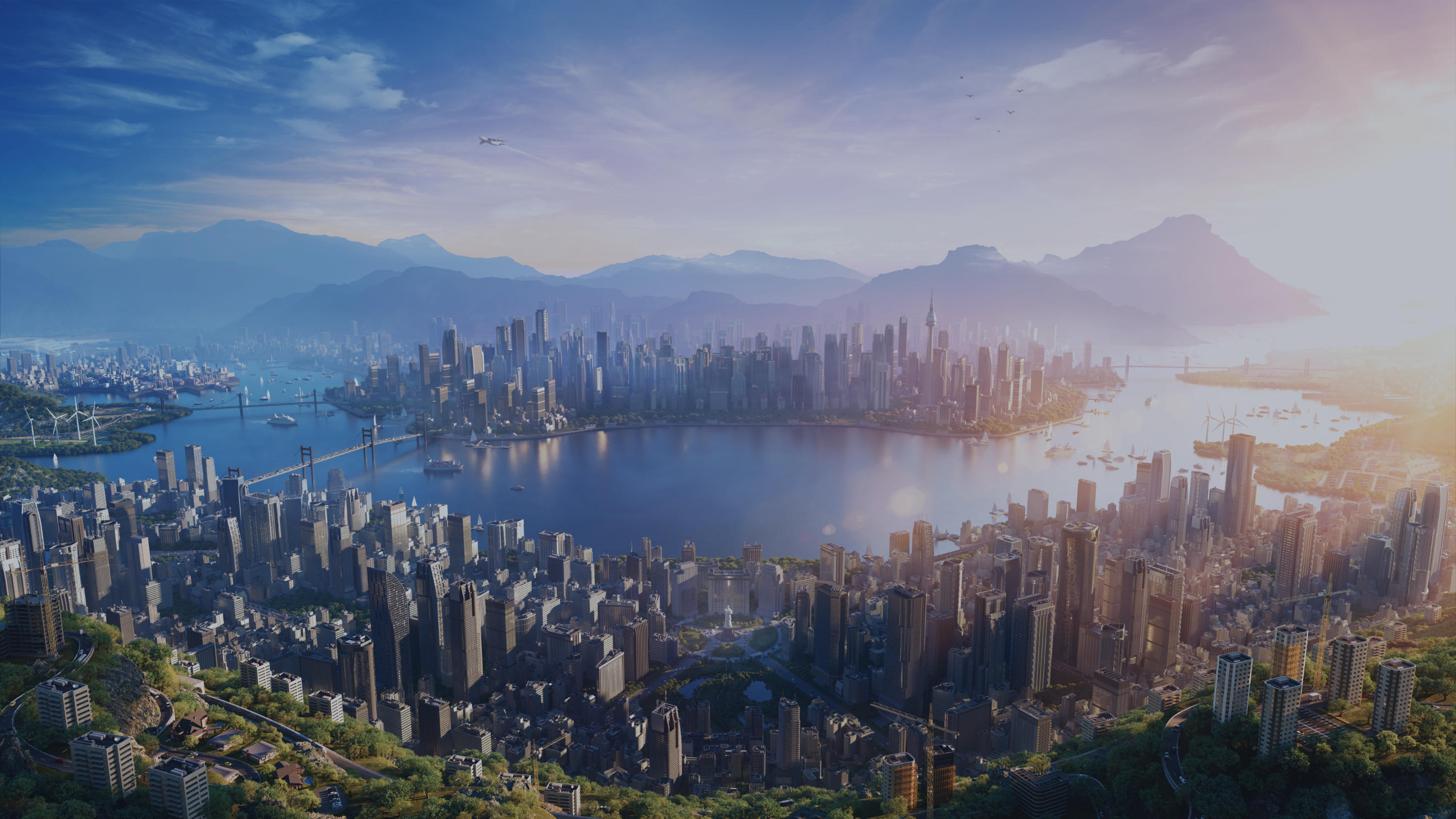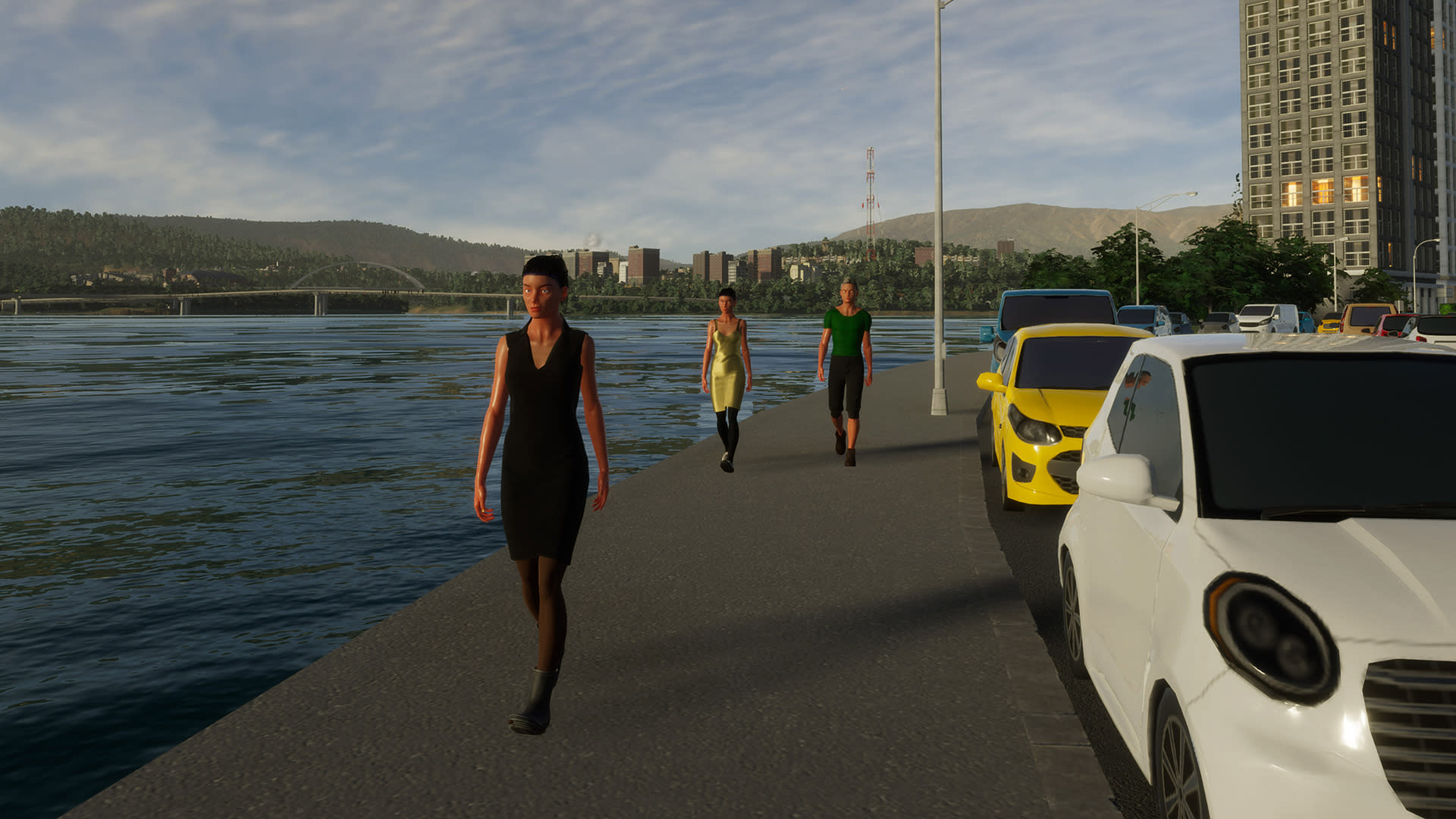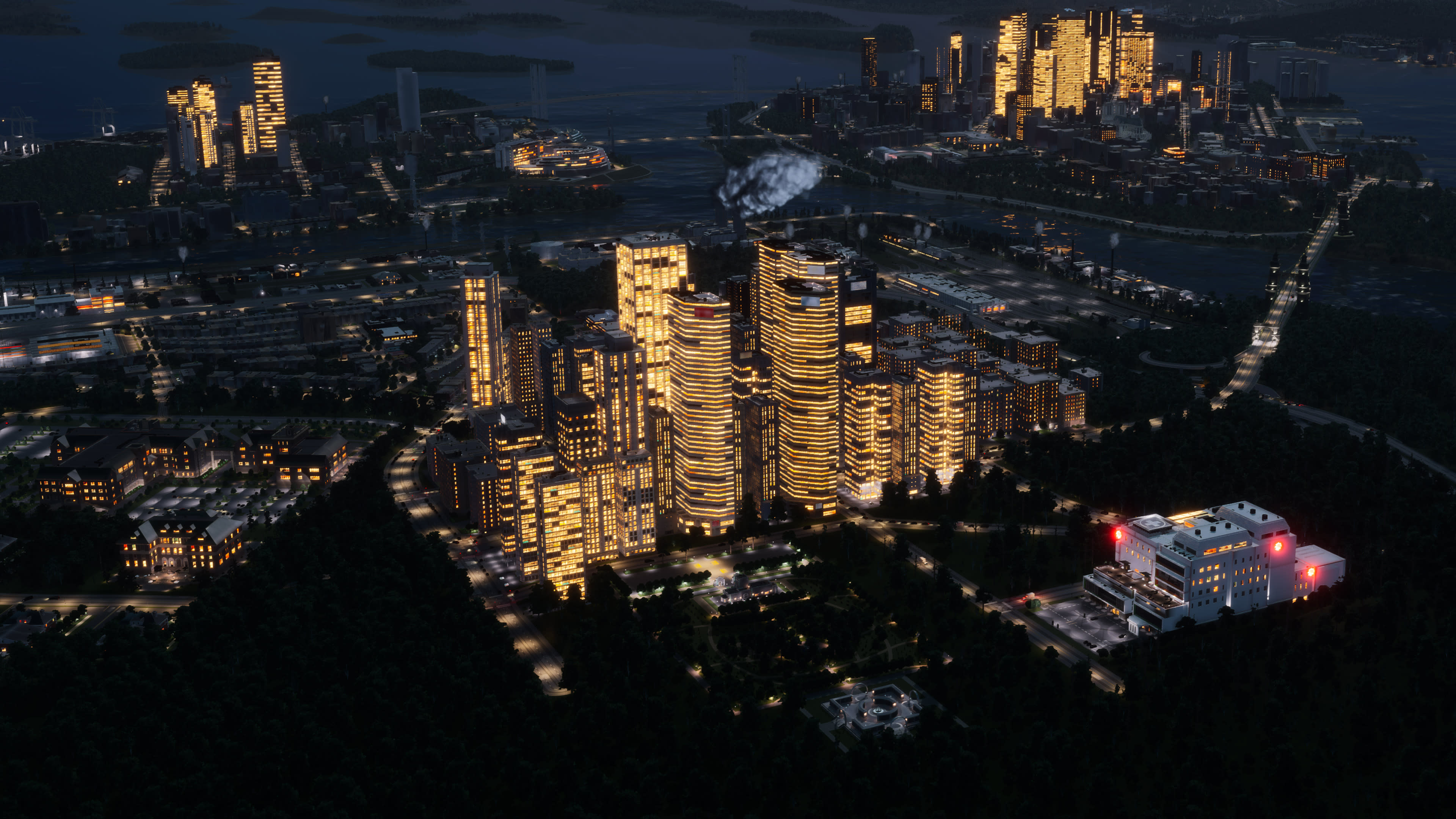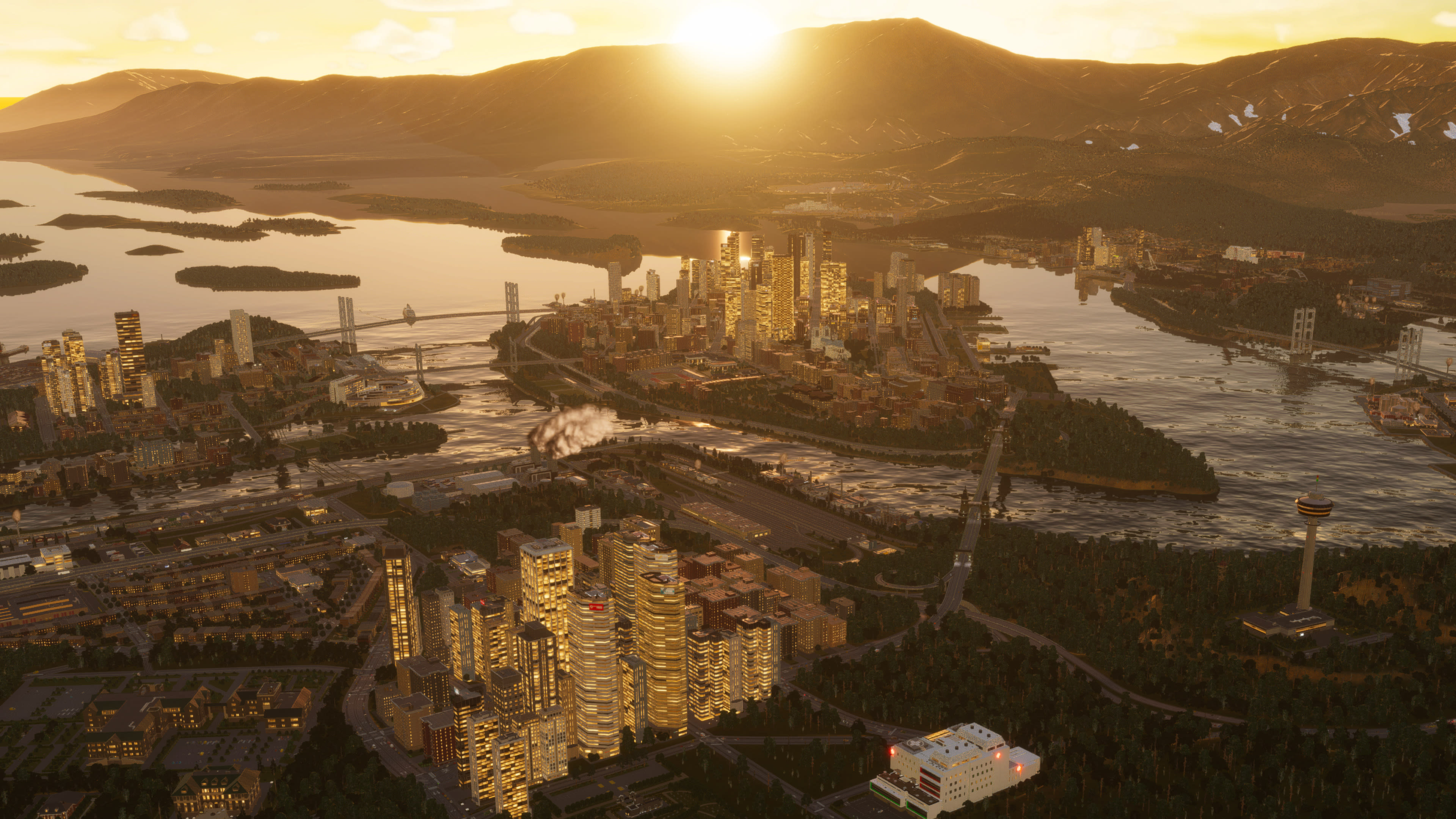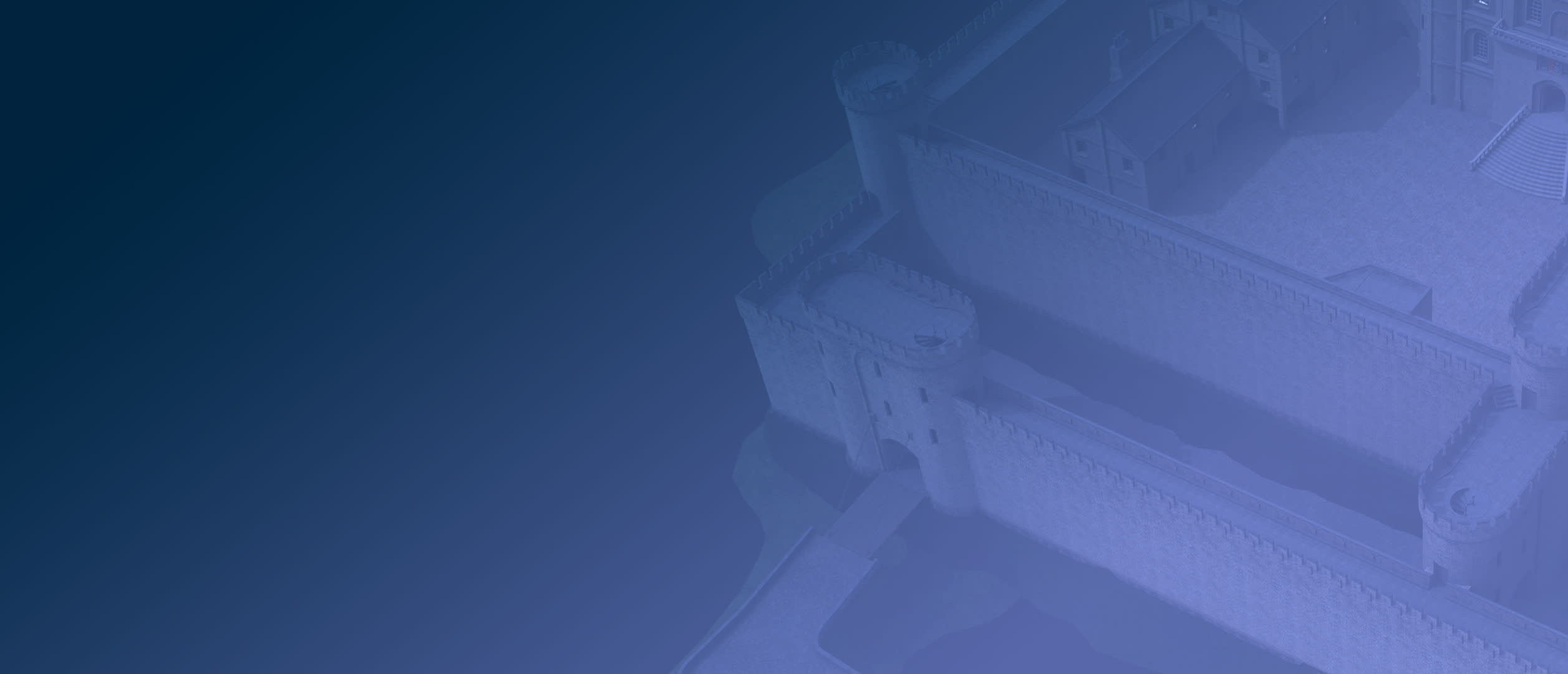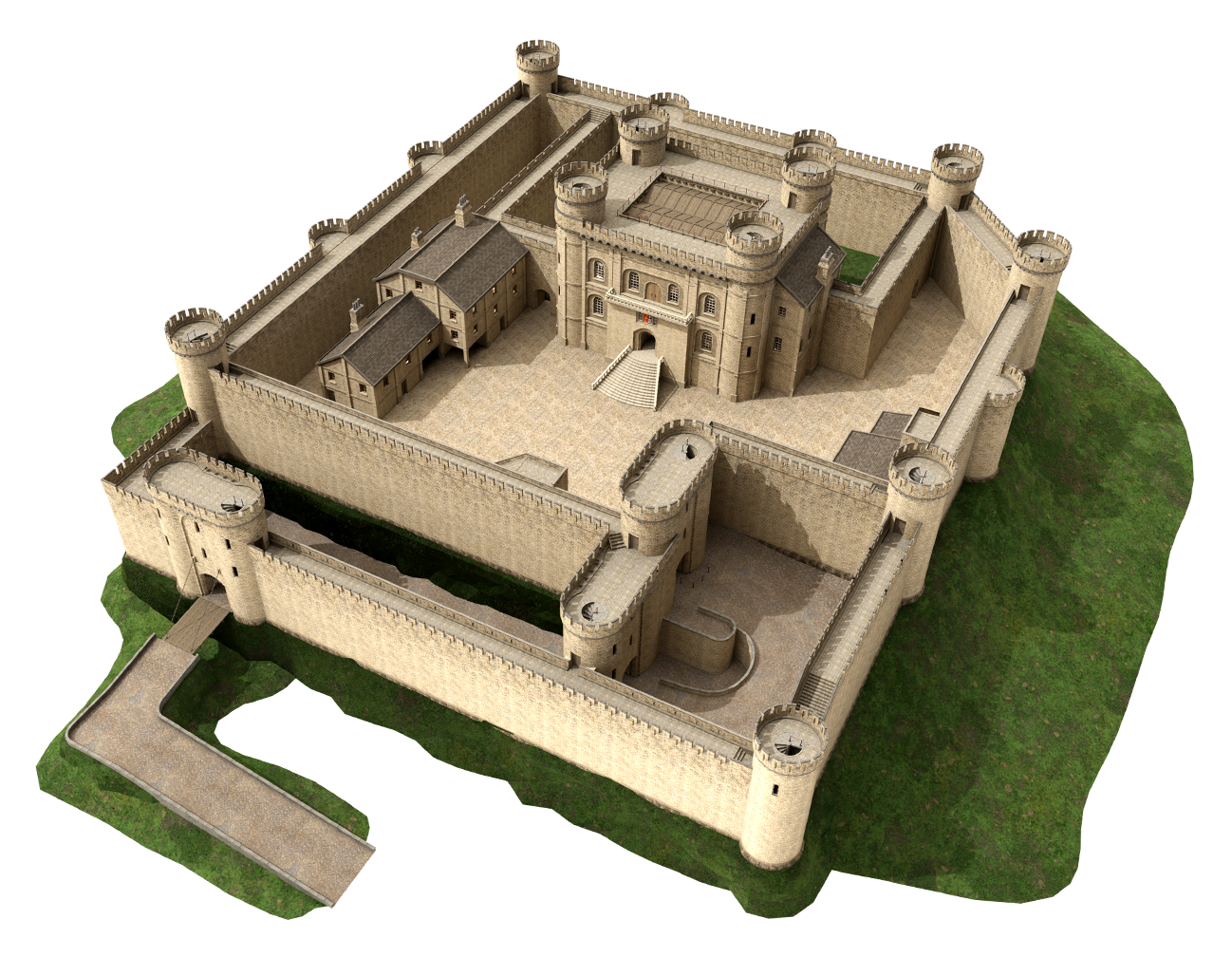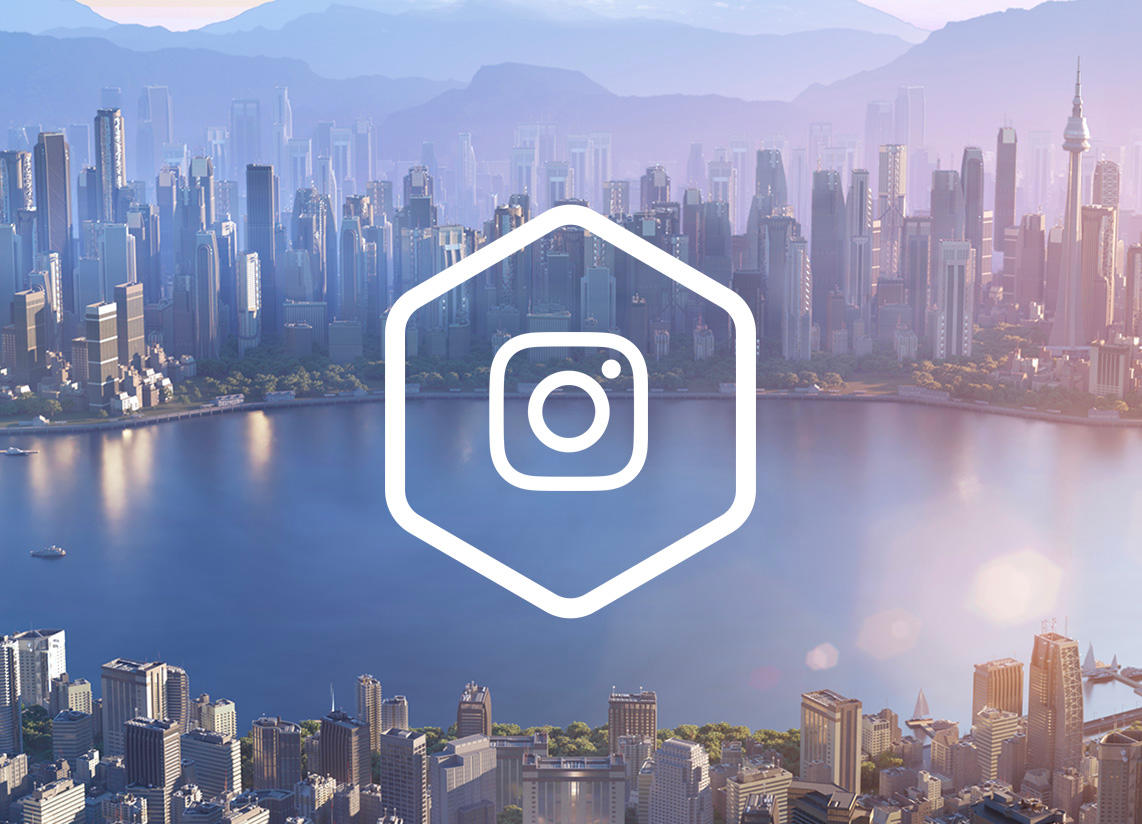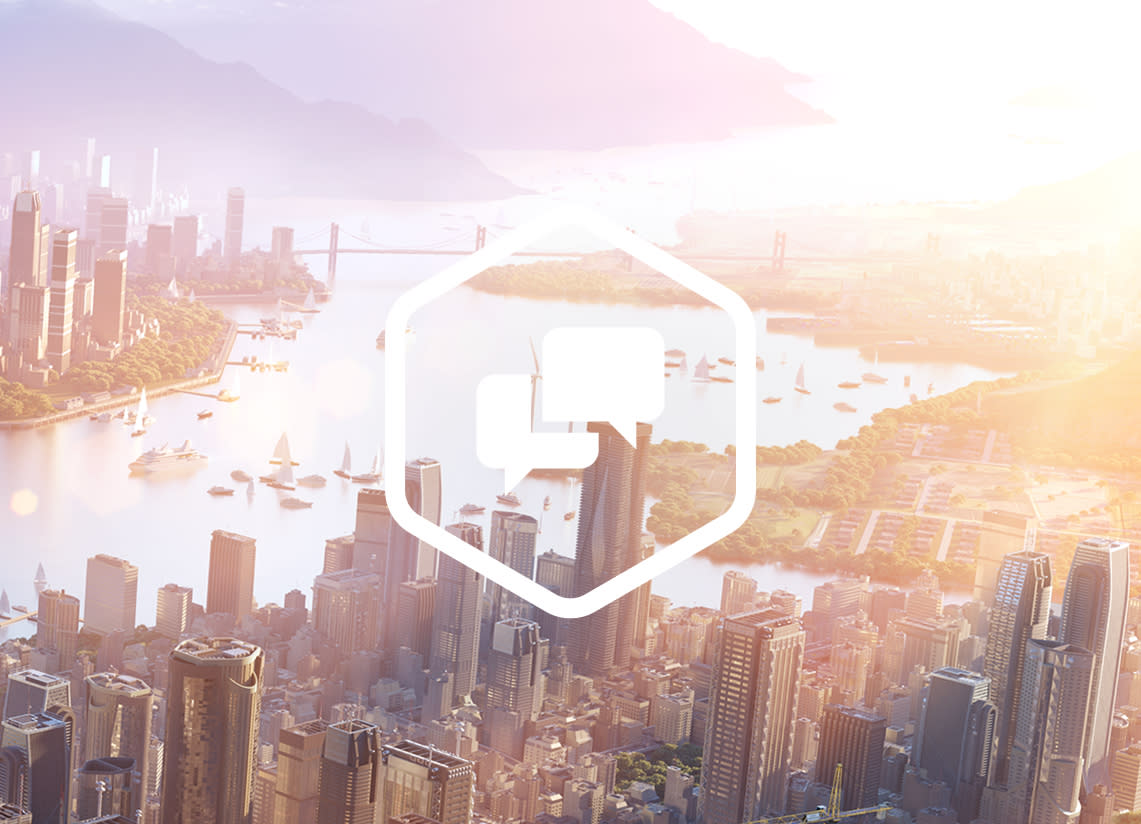Cities: Skylines II Feature Highlight #11: Citizen Simulation & Lifepath
Hi and welcome back to another development diary for Cities: Skylines II! This time we’ll take a closer look at the people populating your cities, their lives, and the choices they make as they grow older as well as how your actions steer their lives in different directions. Citizens act as one of the primary agents simulated in the game. They are the residents of the houses in the residential zones, they are the workforce of the industrial, commercial, and office zones, and they are the customers in the commercial zones. Citizens suffer if the services do not operate properly but they also reap the benefits and flourish if you manage to govern your city well and answer their various needs. Citizens are always up to something choosing from a variety of different activities. These include mundane things such as going to work or school, shopping, sleeping, or studying. They also have rarer activities such as committing a crime, escaping the crime scene, seeking medical treatment, and moving away. Many of these actions have simulation effects such as traveling to different places causing traffic on the roads, shopping causing changes in the economy simulation (albeit small when considering individual households), and getting medical treatment which takes up patient spots at the medical facility. Citizens can own pets. Pet owners are chosen randomly from the citizen pool, and while pets are purely cosmetic and do not affect citizen Happiness or their consumption of Resources, garbage accumulation, or noise pollution, they add a bit of flavor to your city.

You can spot citizens and their four-legged friends around the city Each citizen has their own Lifepath which describes the major events in their lives. They either move into the city or are born there. They grow up, go to school, and find work. They spend their free time at home, in the parks and other attractions, or go shopping in the city’s commercial buildings. They might get sick or become unemployed, and, if they are happy, they will stay in the city and eventually grow old and die of old age. All of which you can keep an eye on.
Happiness
Citizen Happiness is the overall value that represents a citizen’s satisfaction in their life. It is the combination of their Well-being and Health and affects the citizen’s behavior and their ability to work. It is always visible to the player in the citizen’s info panel and hovering over the family’s combined Happiness level with the mouse cursor in the household’s info panel shows detailed information about all the things that contribute to the value.
Well-being
Well-being indicates the citizens’ mental state and sense of safety. Satisfying their basic needs such as having reliable electricity and clean water as well as sufficient sewage treatment so their toilets don’t overflow, will go a long way in building a solid base for their Well-being. Taking care of the garbage piling up and planning residential areas to avoid air, ground, and noise pollution builds on that foundation, while good city service coverage provides a passive boost to citizen Well-being. Furthermore, you will want to ensure your citizens feel safe as living in areas with high crime probability stresses them out and decreases their Well-being. Amenities such as a functioning postal service and high-speed internet connection are valued by citizens along with a suitable-sized apartment that matches their household’s needs. Families tend to look for larger homes in low density housing areas and small apartment buildings while singles and students can still flourish in compact apartments such as those available in tall residential towers and low rent apartment blocks. The citizens are consumers at heart and having options to buy and consume Goods positively affects their Well-being.

The Happiness info view provides a quick overview of what makes your citizens happy or unhappy as well as highlights areas that could be improved
Health
The physical health of your citizens can be inspected in the Healthcare infoview, which shows the Health of the residential buildings as a whole as well the city’s average Health. If a citizen is sick or injured, it is shown in their info panel. Health is affected by the availability of Healthcare in the form of a passive Health boost received by living in close proximity to a medical facility and receiving treatment at medical facilities in case of a sickness or injury from an accident, both of which severely reduce a citizen’s Health.

Keep an eye on your citizens’ health using the Healthcare & Deathcare info view Living in areas affected by air and ground pollution has a negative impact on the citizens’ Health. The stronger the pollution is the more severe the effect. If the city has insufficient sewage treatment, it will cause the sewage to back up decreasing citizens’ Health. While garbage piling up affects the citizens’ Well-being, it also affects their Health, so providing the city with adequate waste management is important for the quality of life of the citizens, and if the city isn’t up to the task, the citizens will tell you about it on their Chirper accounts. Citizens can become sick even if they are not directly affected by any of the aforementioned causes. The probability of becoming sick depends on the Health of the citizen: higher Health reduces the risk of getting sick with a cold. However, when a citizen does become sick, their Health decreases greatly. Sick citizens travel to the nearest medical facility to get treatment for their sickness, but if their condition is too poor to travel by themselves, an ambulance is sent to pick them up.

Medical clinics and hospitals will send out ambulances to pick up sick or injured citizens Citizens also require medical treatment if they get injured in traffic accidents. In that case, an ambulance is sent to the site of a traffic accident to pick up the injured and bring them to the medical facility. Similar to sickness, the citizens get medical treatment while at the hospital or medical clinic. After the sickness or injury has been treated, the citizen’s Health starts to improve. However, while sick or injured the citizen has a chance of dying. The probability is relatively low in general but is related to the citizen’s current Health level; the lower the Health the higher the risk of dying as a result of their condition.
Age Groups
Citizens age through four different life stages, and each age group is visually distinct from the others. You will find children, teens, adults, and seniors in your cities, and families (i.e. households) can comprise multiple generations, from children to grandparents. As citizens get older their education options change and their Health varies. Children and teens have a Health boost while seniors’ Health slowly decreases. Their age also determines their ability to work and every citizen can choose to work once they reach the “Teen” age group, though some will prefer to continue their education before finding a job.

Your city is home to a wide variety of citizens
Preferences
Each age group from teens to seniors has preferences for how to travel the city and what types of Goods interest them when shopping for the household. When traveling, teens prefer the cheaper mode of transport and weigh it against how far they are willing to walk to their destination. If they travel by car, they would rather park far away in a free parking spot than be closer to their destination while paying a parking fee. Adults value time, so they find the quickest way to get where they need to be and are willing to pay whatever fee necessary as long as it gets them there fast - be it parking fees, public transport ticket fees, or fuel costs for their personal vehicle. Seniors prioritize comfort above all else. For them, it’s not about whether it’s cheap or expensive, fast or slow as long as they get as near as possible to their destination and as comfortably as possible. A direct route to the front door is always the best option! Similarly, age groups also have preferences when it comes to shopping for their household. Many available Goods are relatively evenly bought by all types of households but Goods such as Electronics are more likely bought by households with teens than households with seniors. On the other hand, seniors are more likely to consume financial Goods compared to households with children or teens.
Citizens Lifepath & Chirper
Citizens have a lifepath dotted with different events such as graduating from a school, finding a spouse, landing a new job, and moving to a new home or away from the city. You can keep an eye on these events through the Lifepath Journal by following a citizen. This is done by selecting the citizen and clicking the Follow button, adding them to the list of Followed Citizens found on the right side of the screen right below Chirper. The Lifepath Journal records everything from the added citizens from the moment they are followed. The journal entry lists their name, home address, current occupation, Happiness, and other information as well as their Chirper feed where they tell the whole world what is going on in their daily life. A keen player can spot the connections between the citizen’s surroundings such as education options, job opportunities, and living conditions to the changes in their lives, the jobs they get, and the choices they make.

Keep up with your favorite citizens using the Lifepath Journal And yes, you got that right. Chirper, the lovable bird from Cities: Skylines makes a glorious return in Cities: Skylines II! Its functionality has been expanded and integrated more into the core gameplay as citizens voice their happiness and frustration about the various things happening in the city. The chirps relate to actual events and looking at the “likes”, you can see just how important the subject matter is to the chirp sender and other citizens. Citizens can inform you about the lack of city services and congratulate you when their various service and leisure needs have been met.
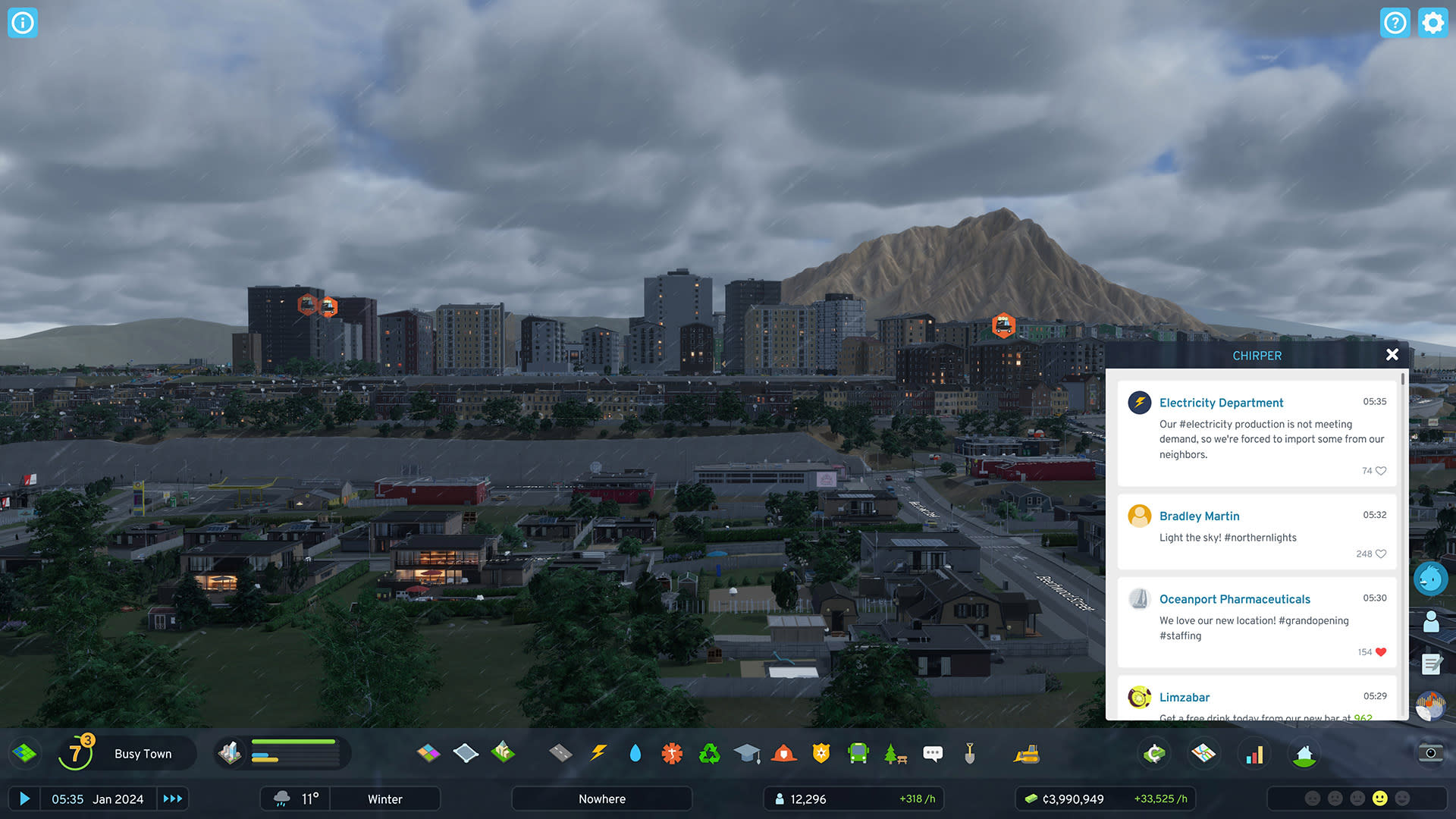
Both citizens and city services use Chirper to share their opinions and important information Citizens also chirp about events in their own lives such as moving together with another person or breaking up, finding a new job, and so on, and as mentioned, they integrate with the Citizen Lifepath giving you an overview of the followed citizen’s life.
Education
There are 5 levels of Education featured in Cities: Skylines II: Uneducated, Poorly Educated, Educated, Well Educated, and Highly Educated. Each school provides one level of education for citizens. Children are Uneducated until they finish Elementary School which increases their Education level to “Poorly Educated”. Children will always go to school if possible, so make sure to provide enough capacity for your city’s children. Only teens can go to High School where they can increase their Education level to “Educated”. Both teens and adults can go to College while adults can attend the Universities available in the city. College graduation rewards citizens with the “Well Educated” status and successfully finishing their University studies grants them the “Highly Educated” level.

Families prefer living near Elementary Schools so their children don’t have far to school Teens and adults can choose to go to school or get a job. To make this decision they calculate the potential income if they choose to go to work and compare it to the income they will receive from a higher education level job after they graduate from school and see which one is more profitable for them. Some citizens have a preference for working instead of school and even if the potential future income would be better in the long run, they will still choose to work instead of studying.
Employment
Companies, found in commercial, industrial, and office zones, and most city services have workplaces for citizens to fill. They are divided into complexity levels which reflect the citizen Education levels. City service workplaces remain the same throughout the building’s existence but when a zoned building levels up, the complexity and composition of the available jobs changes. A higher complexity level company requires employees with higher levels of education than a company with a lower complexity level.

The Workplace Availability info view gives you a breakdown of your workforce and where in the city workplaces are found Zoned companies can also change the number of employees needed. If the company detects that they are doing well, they can expand their workforce. If on the other hand, they are doing poorly, they can shrink the workforce and save on wage costs to remain profitable and survive. Between the different company types, industrial manufacturing companies tend to have lower education requirements for employees regardless of building level while commercial and office companies' level of complexity shifts more towards higher educated employees as they level up.
Work Efficieny
Employee Education level represents their capacity to work in different jobs and positions. Higher educated employees are also more efficient in their work and thus they have a more significant influence on the company's Efficiency as well as its production output. When a company is missing employees, the higher education level jobs impact the Efficiency and output more. Employees are able to do any job at their Education level or lower. Even if a higher educated employee fills a lower level job, their effect on the company’s Efficiency is calculated with the job’s level, not their individual Education level, as they are not able to use all their talents in that position. If the company doesn’t have employees at a high enough Education level, they can’t fill all the available jobs. This results in decreased Efficiency and production. Citizen Happiness also affects the company's Efficiency and thus its production and profitability. Happy employees are a valuable commodity to a company so it is important to take care of the citizens’ Well-being and Health to ensure that the companies can thrive! If an employee gets sick or injured, they cannot work which means that the company loses some of its Efficiency. Once the employee has gotten well, they return to work life and continue contributing to the company’s Efficiency.
Criminal Behavior
Citizens can become criminals. The probability of this is relatively low but the chance is increased if the citizen’s Well-being is low. When this happens, the citizen will commit a crime to earn income by first selecting the target of their criminal activity. The target is a building where the robbery takes place and it is selected by comparing the buildings in the city and their crime probability values. The final choice is a random pick from the group of buildings with the highest crime probability values. The citizens living in the building targeted by the criminal will suffer a temporary loss of Well-being.
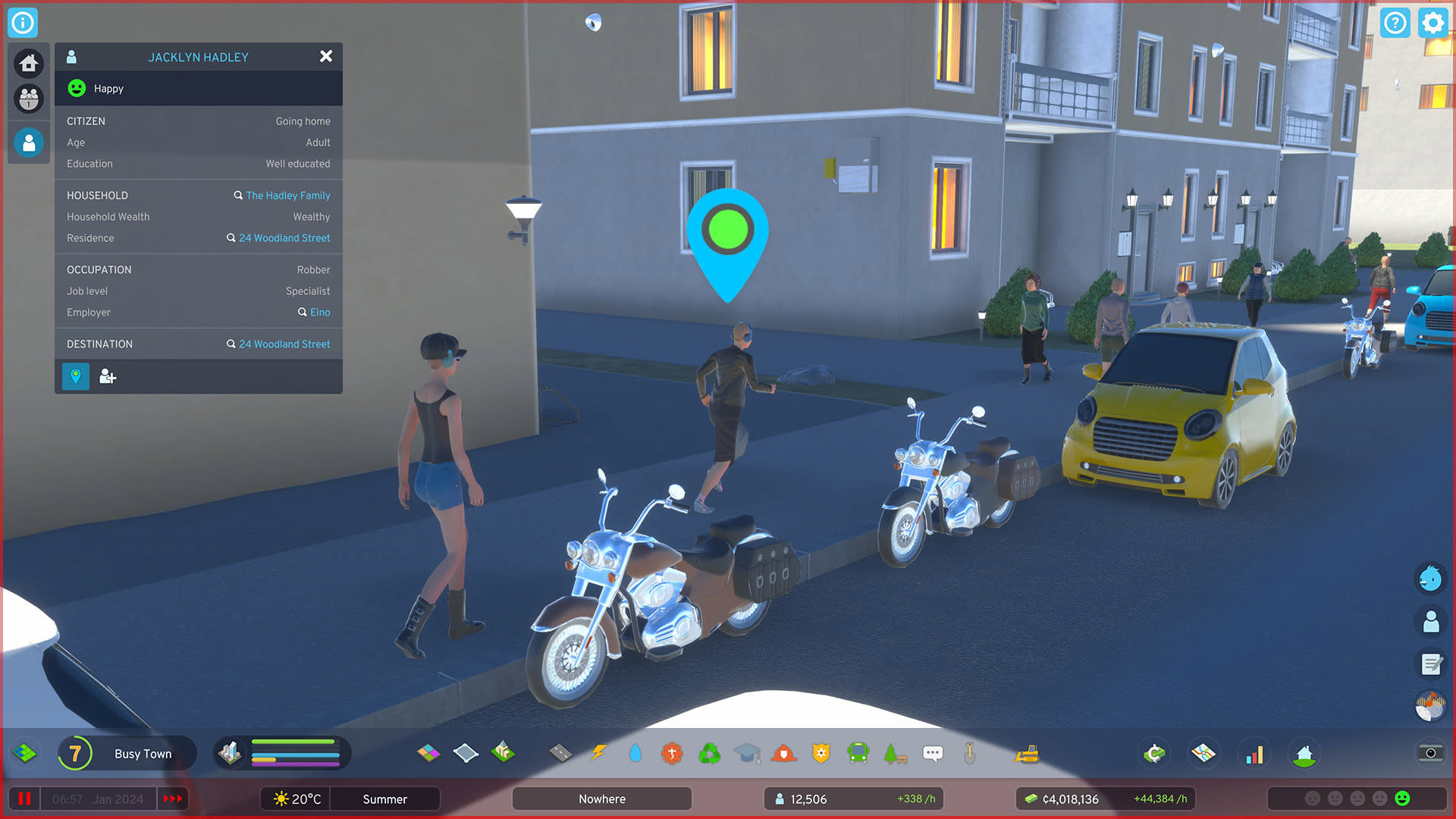
Criminals will flee the scene to avoid getting caught by the police The criminal will travel to the building, commit the crime there (which takes some time) and then leave. When the crime takes place, an alarm is triggered and alerts the police station, but there is a small delay before the patrol car is sent to the crime scene. If the patrol car reaches the location before the criminal leaves, the criminal is arrested. If the criminal leaves before the police arrive, they escape the law and are free to continue their criminal deeds another day! When a criminal is arrested, the police take them to a jail located at Police Stations and Police Headquarters. There a portion of the arrested criminals are sentenced to serve time in Prison, either in the city if one is available, or at one of the Outside Connections if one is not available. Citizens who are not sentenced to prison are released and their criminal status is reset just like criminals who have served their time in prison. Once released they rejoin society as regular citizens. Depending on their age, citizens can die of old age while serving their prison sentence.
Leisure & Tourists
Citizens love their free time and want to spend it in the city visiting parks and other attractions, going shopping, and enjoying entertainment in the various restaurants and bars. This need for Leisure affects their Well-being and when their Leisure decreases, they seek opportunities to increase it. Not all options are created equally though, which means it takes a different amount of time to gain Leisure in different places. Citizens choose the location based on the amount of and how quickly they can gain Leisure while staying there as well as comparing the pathfinding costs to the different locations. More about pathfinding in the Traffic AI development diary.
Tourists & City Attractiveness
Tourists are citizens who visit the city briefly. They stay at a local hotel while in the city and make choices daily whether to visit one of the city’s attractions and commercial areas or to stay at the hotel. The city’s Attractiveness value determines how many tourists are drawn to the city and this value can be increased by building parks and various other attractions such as landmarks. Tourists make similar calculations about their Leisure targets as citizens comparing the Leisure value of the locations to their distance from the hotel and deciding which of them is the best option for them to gain Leisure.

Sunny and warm days invite your citizens to enjoy outdoor activities
Leisure Types
Leisure can be gained from various locations. City recreation includes indoor and outdoor recreation possibilities in the form of tourist attractions and landmarks, parks, plazas, and various sports venues such as a tennis court, soccer field, or community pool. Commercial recreation includes commercial zones where citizens and tourists can go shopping and spend time at the malls and all kinds of cozy boutiques. Citizens can also gain Leisure from Entertainment, visiting local bars, or eating fancy meals at local restaurants. These Leisure locations differ from others in that the citizens and tourists pay for the Leisure gain as they buy beverages and meals while at the location, combining their need for Goods with their need for Leisure.

On rainy and cold days your citizens prefer indoor activities such as visiting the local bar Your citizens can also decide to travel to one of the Outside Connections for Leisure essentially becoming tourists in another city. The whole household hops into their car or on one of the public transport options and leaves the city for a few days. Lastly, Weather affects citizens' and tourists’ behavior when choosing Leisure locations. Good, sunny, and warm weather encourages them to seek Leisure in outdoor recreation places such as parks and plazas while rainy, snowy, and cold weather causes citizens and tourists to seek indoor Leisure in the form of shopping and entertainment.
Citizen Conditions
Certain events can cause Conditions for citizens which are visible on the citizen’s info panel. While there is no direct way to remove Conditions from citizens, the player can investigate the causes and through city management help the overall situation. As an example, if citizens are becoming sick it can be a sign of sewage backing up in pipes, pollution spreading to residential areas, or insufficient Healthcare service in the city causing decreased Health which leads to an increased probability of becoming sick. Depending on the cause you can improve the situation by expanding city services, such as your sewage treatment options, or by building a Medical Clinic or a Hospital to take care of the Sick condition and remove the negative effects from the area making sure that the citizens remain healthy. Below we have an overview of the different conditions citizens can be afflicted with. Conditions
Sick
Sick citizens cannot work. As long as they remain Sick, they are in increased danger of dying. Medical treatment is required to recover from the Sick condition.
Injured
Injured citizens cannot work. Citizens become injured when involved in traffic accidents, building fires and collapse, and natural disasters. Medical treatment is required to recover from the Injured condition.
Homeless
Citizens who cannot pay the rent where they live and with no means to move to another home or out of the city become homeless. They have no permanent residence and end up living in the various city parks.
Unwell
Citizens who are Unwell have a low Well-being value. Their Happiness value decreases and their contribution to work is also negatively affected. Additionally, they are at risk of becoming criminals if their Well-being doesn’t increase.
Weak
Citizens who are Weak have a low Health value. This decreases their Happiness and negatively affects their contribution to work. Citizens with low Health are at a high risk of becoming sick, and when a Weak citizen becomes sick, their Health value decreases to very low putting them at an increased risk of dying if they don’t get medical treatment.
Distressed
Citizens who are in Danger or Trapped, are Distressed. Citizens are in Danger when they are in a burning building while Trapped citizens are involved in a building collapse and are buried under the rubble. Sometimes citizens who are in a burning building can also become Trapped, unable to escape.
Evacuated
Evacuated citizens are in an emergency shelter. Citizens can travel to an emergency shelter by themselves or they can be picked up by an Evacuation Bus which transports them to the emergency shelter.
As you can tell citizens in Cities: Skylines II are more complex than in the predecessor and we hope you will enjoy the new features. Whether you aim to boost Efficiency through happy and healthy citizens or want to follow your favorite citizens as their life evolves in your city, this development diary should help you achieve your goals. Next week we will be back with another development diary to take a look at a different aspect of the game as we look behind the scenes of the Sound & Music in Cities: Skylines II.
